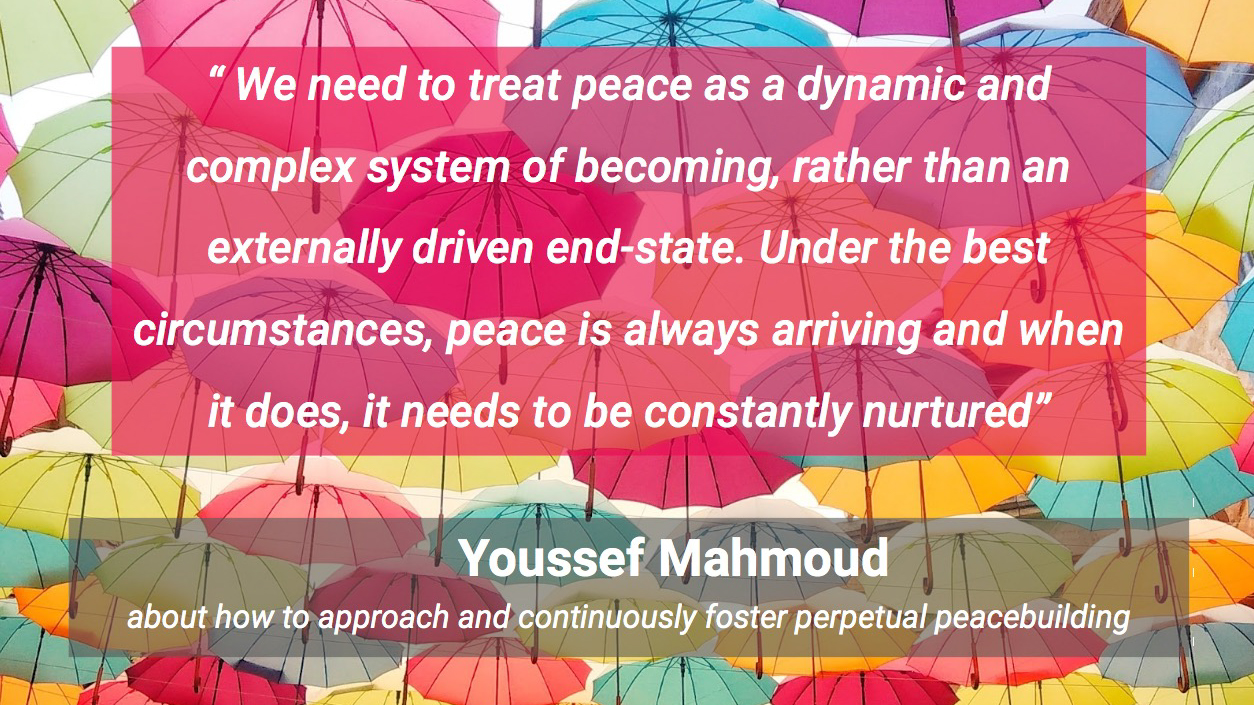RETHINKING PEACE PROCESSES: Our workshop at Geneva Peace Week 2021
It’s event season and at Inclusive Peace, we jumped right into November with a well-attended online session at Geneva Peace Week 2021 on building and sustaining perpetual peace. Thanks to both our speakers, moderators, participants and co-organizers, it became everything we intended it to be: a profound, broad-based discussion on the need to rethink and reshape peace processes towards locally-owned solutions.
In case you missed the event – or attended it and need a recap – this blog details 3 key takeaways from the session which share insights into modern, perpetual peacebuilding tactics, as well as some clips and highlights from our session.
If you want to dive deeper, the recording of the full session here or read more about how to change the way we think about and make peace in this blog post written by Inclusive Peace’s Executive Director.
Additionally, we had the pleasure of having the talented Iulia Zolotcov join the session as our graphic recorder, and have compiled a great video timelapse of the graphic recording which shows how the discussions evolved. Let’s have a quick look at key points on the current barriers to perceptual and inclusive peacebuilding for international communities.
TAKEAWAY 1: ACKNOWLEDGING AND ADDRESSING TOKENISM
A key insight from both our panelists and the discussion in the breakout rooms, is that tokenism is still widespread when it comes to inclusion in peacebuilding and peacemaking. It is, therefore, critical to ensure that inclusive efforts are comprehensive and effective.
Possible solutions to explore should
- focus on leveraging governance and accountability systems that are already in place and also creating new ones
- take advantage of synergies for local groups to enhance their capacity and agency
- include thinking about how elite inclusion can have a positive knock-on effect for broader inclusion rather than conceiving them as antithetical
TAKEAWAY 2: BALANCE BETWEEN LOCAL AND INTERNATIONAL ACTORS & ACTIONS
Another insight derived from our workshop was how international, regional and local actors should change their modes of engagement. A central theme in the discussion was the need to strike the right balance between local and international actors in terms of involvement with, actions for and ownership of solutions for peace processes.
This “right” balance should entail
- Improved coordination between internal and external actors, and among external support actors with a particular and a focus on eradicating competition
- An inversion of current top down prejudices that are prevalent in certain contexts, including problematizing what we mean by the international community (i.e. not just Western or large power interests)
- Avoiding romanticizing the local and by extension demonizing the international. In reality, there is tremendous range in the types of actors, approaches, and ways of collaborating which defy the binary (local/international).
TAKEAWAY 3: DEFINING AND IDENTIFYING “THE LOCAL”
A third insight from the session focuses on the need to define what we mean by local actors and then to identify who are (all) the relevant local actors in a given process. It is absolutely clear that creating active local engagement and fostering a sense of local ownership creates agency for local stakeholders and ensures that the needs and priorities of local actors are channeled into national processes.
Hamzat Lawal, one of the speakers, and an activist and founder of Follow The Money – the largest Pan-African grassroots data-driven movement – gave some more insight into how civil agency and integration are key to solving communal issues, such as vandalism in Nigeria.
Taking these insights into account, peacebuilding strategies should focus on creating a sense of ownership amongst key community members and leaders, as well as connecting them with governmental actors in influential positions.
Initiatives should consider
- A thorough needs assessment of local community members and focus on creating spaces for them to air their grievances with the promise of being heard and taken seriously
- The diversity of perspectives from within the community and not assume that everyone relates to the same problem or requires the same peacebuilding solution
- Well-designed channels and structures for communication ensuring information flow not only from community members to government officials, but also back again
SUM UP – WHAT’S NEXT?
At Inclusive Peace, we incorporate these insights into why we need to rethink peace processes and what solutions might look like into our ongoing work on transforming the way we think about and make peace.
For 2022, we are cooking a couple of very exciting events and projects on rethinking peace processes – so keep an eye out for more initiatives from us and our partners on rethinking peace processes. In the meantime, we give the last word to one of Inclusive Peace’s senior advisors, Youssef Mahmoud, former UN Under-Secretary General.

